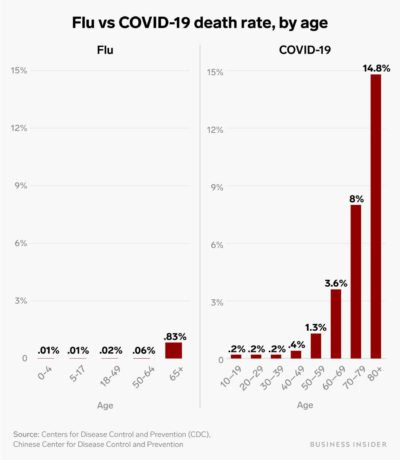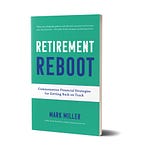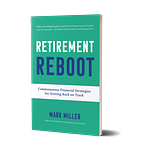
This week on the podcast, we’re going to talk about stock market volatility and risk with two financial planning experts who deal with both on a regular basis as they work with clients. As of this writing (Wednesday), the S&P 500 is down nine percent - and that’s just today. The S&P is down about 25 percent from its peak in February and there’s no reason to think the market won’t fall further before it stabilizes.
In some respects, this episode is about fear. Plenty of retirement investors are experiencing it - fear about the market’s volatility, and the risks that poses to their retirement. And even more important is our fear about the future health of the economy, which is headed toward a steep recession induced by the health crisis.
My guests are two experienced financial planners. Allan Roth is the founder of Wealth Logic. Allan has been working in the investment world for decades in both corporate and personal finance. Also joining me is Jay Abolofia, founder of Lyon Financial Planning. Another interesting thing - Jay has an Ph.D. in applied economics. So, he brings a perspective to this that goes beyond just the markets.
Listen to my conversation with Allan and Jay by clicking the player icon at the top of this newsletter page. The podcast also can be found on Apple Podcasts, Spotify and Stitcher.
Separately, check out my Reuters column this week on the same topic, and this one for The New York Times last week on market risk. The story poses this question: what if you just want to get out of the market entirely? Is that advisable? (Spoiler alert: my answer is “no.”)
Coronavirus forces Social Security to close its offices
The coronavirus crisis forced the Social Security Administration to close its network of more than 1,200 field offices to the public this week. The offices help thousands of people every day with applications for retirement, disability and Medicare benefits.
Field offices will be closed to the public in most situations until further notice because of the coronavirus public health crisis, administration officials said. Offices that hear disability insurance appeals also are closed.
Most employees will be working remotely; service will continue to be available via the agency’s toll-free line, (800) 772-1213, and its website. Payments to more than 69 million Social Security beneficiaries are not affected.
Keeping the offices open was a threat to the public’s health and that of the agency’s work force. Visitors often experience long waits in rooms filled with dozens of people — most often, seniors and disabled people, who are among those most at risk from the virus. Cleaning of the offices is minimal.
Field offices will only offer in-person assistance for a very short list of crucial services. These include reinstatement of benefits in dire circumstances; assistance to people with severe disabilities, blindness or terminal illnesses; and people in dire need of eligibility decisions for Supplemental Security Income or Medicaid eligibility related to work status. Those seeking these services must call in advance.
For all other services, you’ll need to use the toll-free number or the website.
In The New York Times earlier this week, I detailed the ins and outs of how business can be conducted going forward with Social Security. A topic of special concern now is scams - it’s sad to say, but fraudsters working identity theft schemes are likly to try to take advantage of the heightened phone traffic that will be going on between Social Security and claimants. So, pay careful attention to the info in that Times story on that subject, and also consult this separate piece about Social Security fraud.
Why Coronavirus is nothing like the flu
No serious public health expert thinks that comparisons of COVID19 with garden variety flu are valid. Here’s Charles Ornstein of Propublica:
As Dr. Anthony Fauci, director of the National Institute of Allergy and Infectious Diseases, and others have said, COVID-19 is deadlier than the flu. It’s deadlier for young adults. It’s deadlier for older adults. In China, early data shows that it was 10 times deadlier. This chart from Business Insider compares U.S. flu deaths to deaths in China from COVID-19.
The flu kills less than 1% of infected people who are over age 65. By comparison, in China, COVID-19 killed 8% of those infected who were 70-79 and almost 15% of those infected who were age 80 or older.
A primer on annuities

The annuities market is plagued by an assortment of opaque names for its products. Look under the hood of the industry and you will find that some annuities are fairly easy to understand while others are not. Lately, the most complex ones seem to sell best.
How to navigate the annuities landscape? Let’s get out the maps.
Roundup of important coronavirus developments
The risk of contracting the coronavirus and becoming ill with COVID-19 is highest for older Americans. One thing I do every week as a journalist covering retirement aging is to sift through hundreds of articles and research reports, and right now virus news is everything. Each week in the newsletter, I’ll be curating and passing along the best information I can find for readers. My aim here is not quantity, but quality. We’re all being inundated with information right now, so I’m doing my best to send along only the stories I think are must-know and that come from information sources I know are rock solid.
This week’s news:
NPR: Nursing homes brace for coronavirus threats . . .How well does a particular nursing home stack up on fighting infections? . . . . The Trump administration has been working to relax regulations governing America’s nursing homes, including rules meant to curb deadly infections among elderly residents . . . The federal government has lifted restrictions on telemedicine to make it easier for physicians to interact with patients during the crisis . . . Married couples have different styles of coping with crisis . . . In the age of Covid-19, we’re all getting a taste of social isolation many older adults experience daily . . . As coronavirus surges, programs struggle to reach vulnerable seniors living at home.











